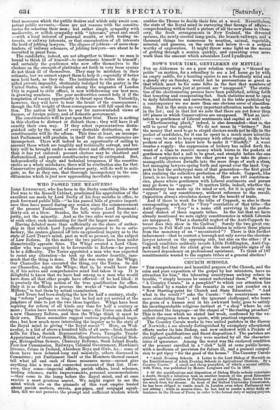WHO PASSED TITF, MEASURES?
Loan linThillaST, who has been to the Derby something like what Peel was to the Russell Cabinet, proclaimed his approbation of the excellent use made by Lord Derby of his four months in office, to push foreward public bills—" he has passed bills of greater import- ance than have passed during any session since the commencement of the present Parliament." Too fast, replies Lord Beaumont; thirty-six at a blow. Besides, the bills were passed by the ma- jority, not the minority. And so the two sides went on speaking at each other, each insinuating for itself the larger merit. 'aving debated more than sufficiently on the share of author- ship in that which Lord Lyndhurst pronounced to be so satis- factory, the orators glanced off into an episodical inquiry as to the state of Lord Truro's mind, past as well as present, on the subject of Law Reform. In this matter the two parties have been under diametrically opposite fates. The Whigs created a Lord Chan- calor who was expected to be favourable to Reform—he proved to be a difficulty. The Tories appointed a man who was expected to resist any alteration—he took up the matter heartily, inso- much that the thing is done. The idea was ours, say the Whigs. Our Chancellor has executed the thing, cry the Tories. So did our Chancellor, rejoin the Whigs ; that is, he would have done it, if his active and comprehensive mind had taken it up. It is delightful to know that we have had among us a man who would have done all that other people have effected—if he had liked : it is precisely the Whig notion of the true qualification for office. Only it is so difficult to procure the works of "mute inglorious Miltons," to test them by actual examination.
Lord Truro had been studying the law for half a century, study- ing "reform" perhaps as long; but he had not yet arrived at the jurkoture of time to plat the two ideas together. Whigs have been aspiring for reform of all kinds any time for half a century or more ; Tories have been resisting the same ; the Tories can dash off a new Chancery Reform, and then the Whigs think it must be their own. These anomalies suggest curious psychological inqui- ries; but how much more interesting the inquiry as to the state of the Royal mind in giving "the Royal assent" ! Here, on Wed- nesday, is a list of above a hundred bills of all sorts—Irish Switch- mills for Flax, Scotch Representative Peers, Turnpike Trusts' Appointment of Overseers, Militia, Slaughterhouses, Colonial Bish- ' ops, Metropolitan Sewers, Chancery Reforms, Sunk Island Roads, Poor-law Commission, Railways, Colonial Government, Hawkins's Divorce, Crime in Ireland, Aberdeen Boys and Girls, &c. : some of them have been debated long and minutely, others discussed in Committee; yet Parliament itself or the Members thereof cannot tell what all and each of those measures mean—cannot give anything like a true and connected account of that list. How- ever, they come—imperial affairs, parish affairs, local schemes, trading schemes, rustic improvements, personal accommodations —they come in the lump before the Royal mind, and at once receive a most gracious assent. We might regret to see the mind which sits on the pinnacle of this vast empire busied about parish matters, streets, gas-pipes, and conjugal squab- bles, did we not perceive the prompt and sufficient wisdom which enables the Throne to decide their fate at a word. Nevertheless, the state of the Royal mind in surveying that farrago of affairs— comprehending within itself a picture of all the new plans in Chan- cery, the fresh arrangements in New Zealand, the divorced spouses, the newly-erected lamp-posts, the branch-railways, and a thousand things too numerous to mention, animal, vegetable, mineral, and gaseous, on the earth and below it—es a subject worthy of exploration. It might throw some light on the means of getting through a session quickly, and executing even more work than the amount which astonishes Lord Lyndhurst.


























 Previous page
Previous page